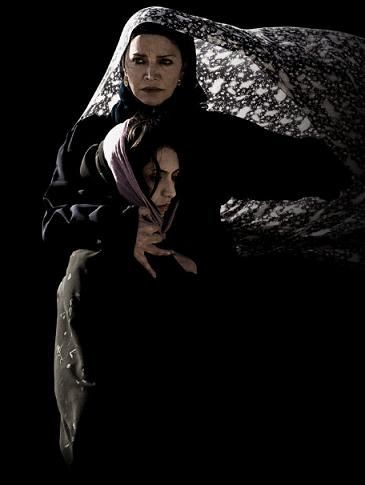The Stoning of Soraya M.

When French journalist Freidoune Sahibjam's (James Caviezel, "The Passion of the Christ") car breaks down in the Iranian countryside shorting after the Ayatollah Khomeini's ascent to power, he is towed into the small village of Kupayeh, where, oddly, the local mechanic claims to be too tired to fix his car and the town's mayor and Mullah will not leave him alone to talk to Zahra (Shohreh Aghdashloo, "House of Sand and Fog," "The Sisterhood of the Traveling Pants 2"), an older woman they claim is crazy. She persists and secretly tells him the story that would become his shocking book, "The Stoning of Soraya M."
Laura's Review: C
Cowriter (with wife Betsy Giffen Nowrasteh, "Under Pressure")/director Cyrus Nowrasteh (producer/writer of TV's "The Path to 9/11") takes the unthinkable true story of a vile injustice and presents it in such a cliched, television manner, that I immediately recalled this year's earlier "American Violet," another story of injustice against a woman and a people that felt too black and white. Then he gets to his stoning. Anyone who thought "The Passion of the Christ," with which this film shares producer Stephen McEveety and star Caviezel, was its own form of torture porn, be forewarned. While I could take Gibson's self-flagellation (the man's a better, more experienced filmmaker after all), "The Stoning of Soraya M." made me physically ill, as if watching a woman's demise designed for gorehounds, an experience intensified when it became clear that, even if a human body could snap about like that under a hail of rocks, there was no way the actress playing the character could have done it (the stoning scene, which goes on for about thirty minutes of screen time, was accomplished by puppetry, wires and CGI). It is the very act of detecting the filmmaking itself, the detail and insistence on conveying how horrific a stoning is that made it seem sensationalistic. And yet, the film has stayed with me. Zahra creeps about her village streets, ducking into crevices like an undercover agent (later she spreads her black shawl to shield like a caped crusader). 'I speak English,' she whispers to the stranger (she's id'ed him as a journalist after spying his tape recorder and most of the film is in subtitled Farsi) as a way of separating herself from the men who seek to shut her up. Sahibjam slips into Zahra's courtyard and turns on his tape recorder and Zahra tells him how the devil came to visit her village just the day before. The Nowrastehs then tell Soraya's tale in flashback and there is little subtlety and no surprise in how events will unfold. Soraya (Mozhan Marnò, "Traitor") is the attractive mother of two boys and two girls whose arrogant husband Ali (Navid Negahban, TV's 'The Path to 9/11") is a Tehrani prison guard who wants to divorce her to marry the 14 year-old daughter of an imprisoned doctor but who offers practically nothing for her to live on with two young girls (he, of course, will keep the boys, the eldest of which is turning into a younger version of himself). Ali blackmails the Mullah (Ali Pourtash) who was once his prisoner, and the Mullah tries to convince Soraya that she should be his 'temporary wife,' a form of religiously sanctioned prostitution. She refuses his advances in disgust and things appear to be at a stalemate. Then the simple mechanic Hashem (Parviz Sayyad) loses his wife and the mayor, Ebrahim (David Diaan), who once proposed to Zahra, gets her to convince Soraya to take a job helping Hashem run his household. Now that Soraya is earning some money, her situation may not be so bleak, but Ali is impatient and cooks up an infidelity charge which he and the Mullah threaten Hashem to uphold. Soon, the entire village is in a frenzy and Soraya's own father not only announces her conviction, but hurls the first stones. The mayor, who has prayed to god to give him a sign should Soraya be innocent, ignores the fact that the stones thrown by Soraya's father have not made contact, allowing Ali to pick up the assault. The filmmakers deliberate over the decision of each character to pick up a stone, including Soraya's sons, the town gossip Leila (Bita Sheibani) and even the little circus that rolls into town just as the horror is about to begin. But was it really necessary to dress Soraya in white, the better to show the copious amount of blood that will be spilled? Do we need to see the impact of each stone, the jerking of the body buried to its elbows, the point of view shot of a hail of stones descending? The filmmakers have gone way overboard. Soraya's soul's departure is shown with the repetition of a foreshadowing walk in a blooming field with her daughters. Their coda, in which Sahibjam makes his escape, is also the stuff of melodrama, ending with an overhead shot of Aghdashloo, her shawl swirling about her, declaring that 'the whole world will know.' Aghdashloo is capable here of fierce emotion, but she has been physically directed like a silent movie star. Simply put, "The Stoning of Soraya M.," is a story worth telling and while the Nowrastehs have done that, they have used a sledgehammer.
Robin's Review: DNS
DNS

